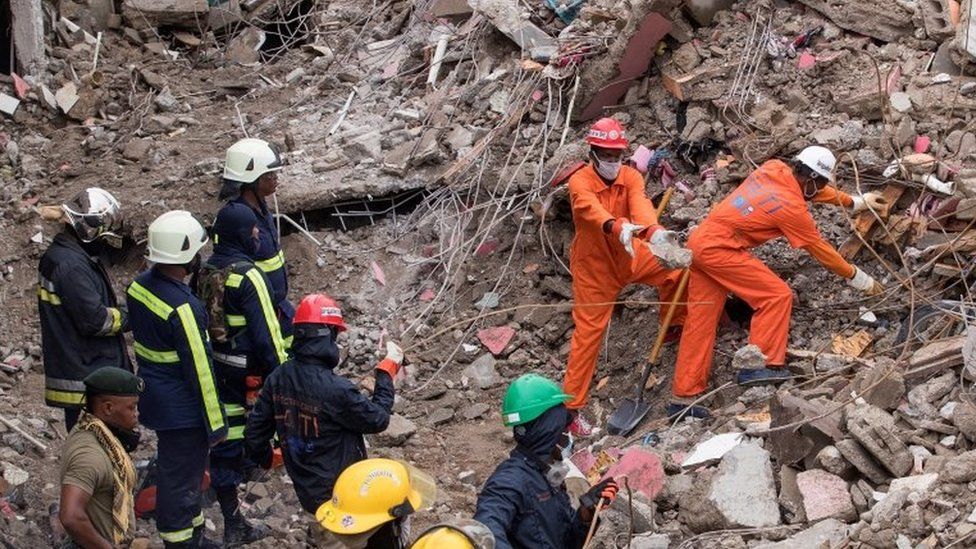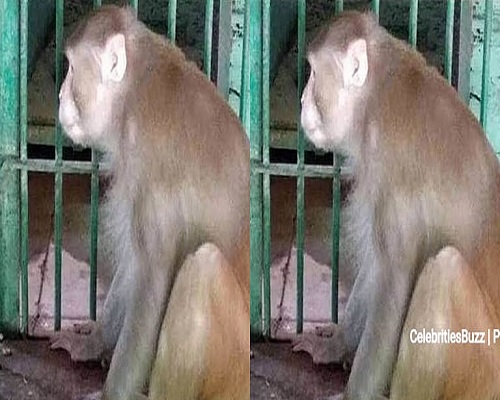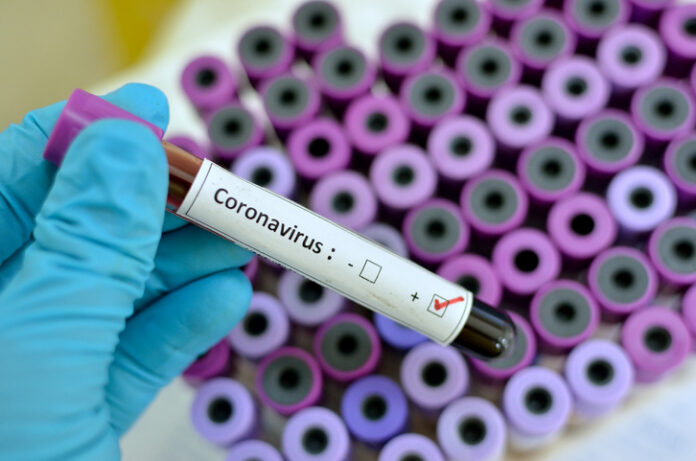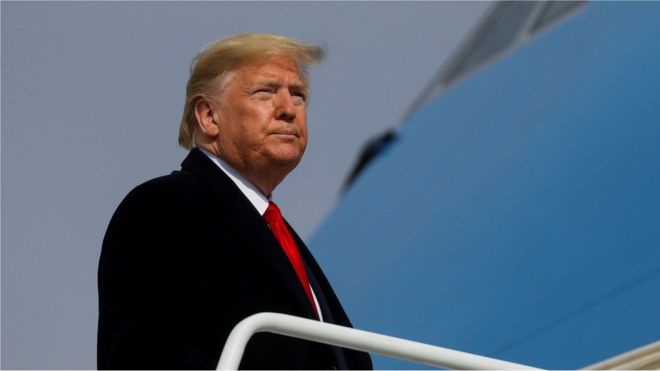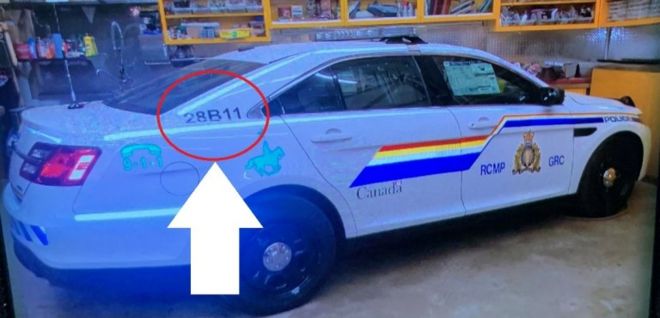Haiti president’s assassination: What we know so far
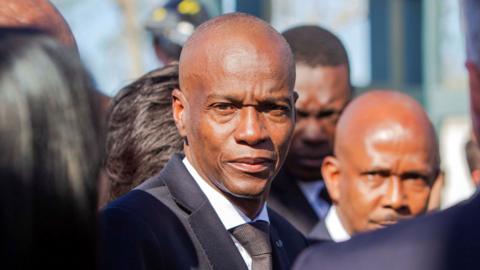
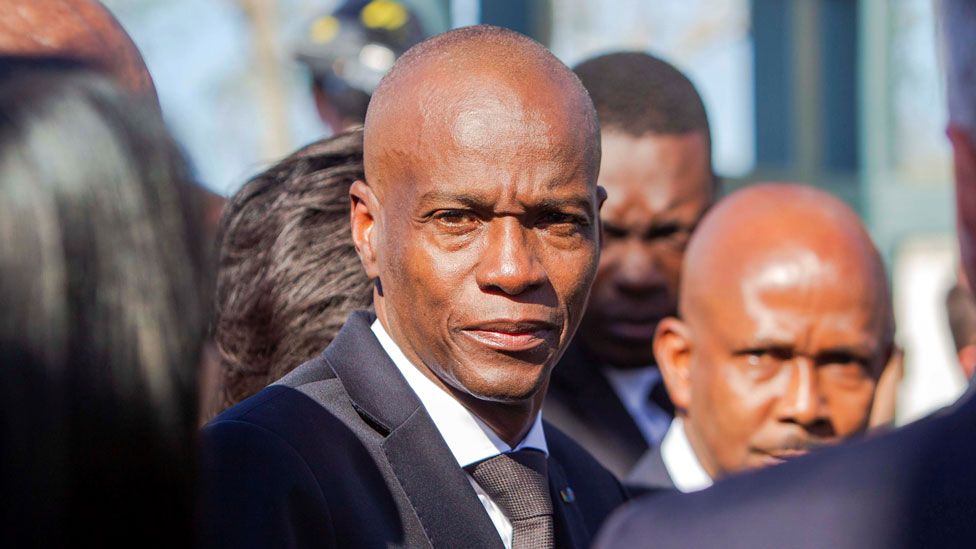 IMAGE COPYRIGHTGETTY IMAGES
IMAGE COPYRIGHTGETTY IMAGESHaiti’s President Jovenel Moïse was assassinated by armed assailants who stormed his private residence in the capital, Port-au-Prince, on 7 July.
Here is what we know so far.
What happened?
A group of gunmen broke into the home of President Moïse in the Pelerin neighbourhood at 01:00 local time (05:00 GMT) on Wednesday 7 July.
They shot the president 12 times.
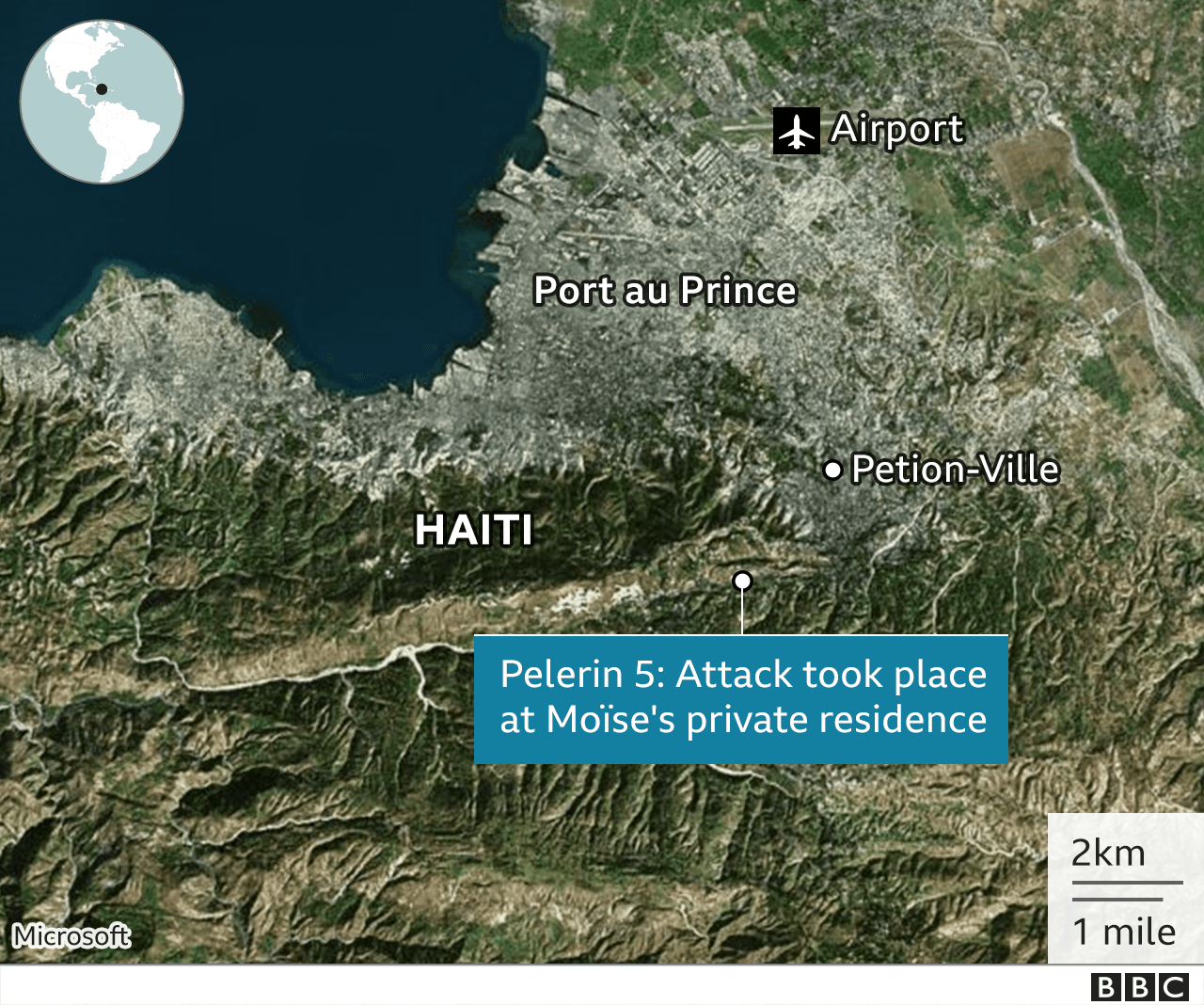

Mr Moïse was found lying on his back, his shirt soaked in blood, with his left eye gouged out, a magistrate said. He had bullet wounds to his forehead, and several to his torso. He died at the scene.
The First Lady, Martine Moïse, was also shot but survived. She has been airlifted to Florida, in the US, and is said to be in a stable condition.
The couple’s adult daughter, Jomarlie Moïse, hid in her brother’s bedroom and was unhurt. She and her two brothers are in “safe locations”, officials said.
How did the attackers get in?
Video footage, which has not been independently verified but which is thought to have been taken as the assailants entered the property, shows armed men dressed in black arriving in white SUVs.
A man appears to have been forced to lie face down in the street while another man can be heard shouting in English over loudspeaker “DEA [US Drug Enforcement Administration} operation, everybody stay down!”
Haiti’s ambassador to the US, Bocchit Edmond, said that while the attackers had disguised themselves as US drug agents, he believed there was “no way” they really were US agents.
Officials say that the ground between the property’s gatehouse and the residence was littered with cartridge cases, indicating that multiple shots were fired.
The gunmen tied up two members of the domestic staff, while continuing to shout “DEA operation”.
They ransacked Mr Moïse’s office and took a cheque book in the couple’s names as well as the servers that held the surveillance camera footage from the residence.
The two top security officials in charge of Mr Moïse’s safety are under investigation and have been summoned to appear at hearings scheduled for 13 and 14 July.
How did the assailants flee the scene?
Little information has so far been released about the hours immediately after the attack.
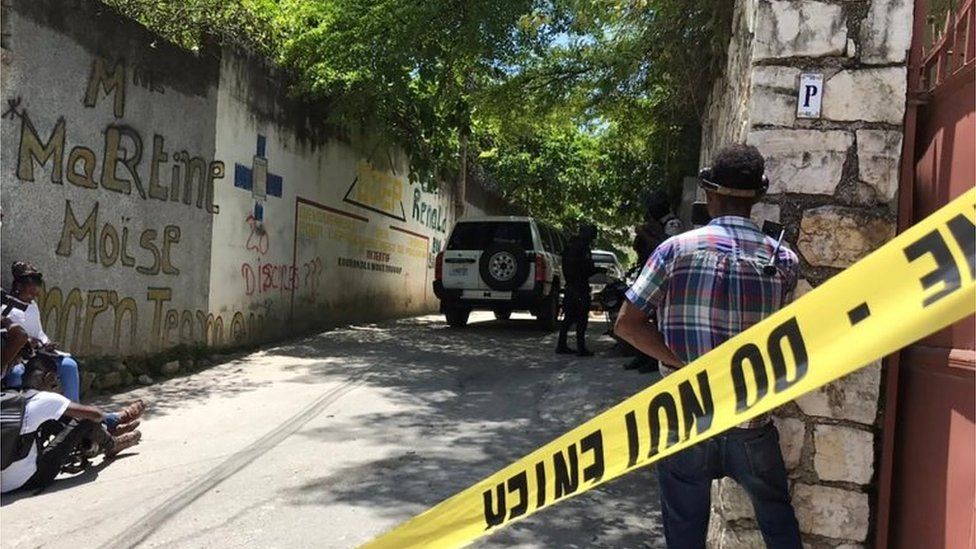 IMAGE COPYRIGHTREUTERS
IMAGE COPYRIGHTREUTERSHaiti’s police chief announced some 24 hours after Mr Moïse’s assassination that a fierce gun battle was under way in the Pelerin neighbourhood.
“We blocked [the suspects] en route as they left the scene of the crime. Since then, we have been battling them” Chief Léon Charles said without specifying an exact timeline.
The police chief also said officers had managed to free three policeman who had been taken hostage by the gunmen. He originally said four suspects had been killed in the gun battle, but that number has since been revised down to three.
It has emerged that 11 of the suspects fled to Taiwan’s diplomatic compound in Port-au-Prince.
Taiwanese officials said they were informed by Haitian police that the suspects were hiding in the compound early on 8 July, more than 24 hours after the attack.
Taiwan allowed the police access and all 11 suspects hiding within were arrested “without problems”.
Two suspects who were hiding in a ravine were caught by civilians who had joined in the search.
The body of one alleged gunman was found on the roof of a home, where he bled to death while hiding. Two more suspects were found dead very close to the president’s residence.
Who are the suspects?
Haitian police say there are:
- 28 suspects in total, of which
- 17 have been apprehended
- 3 have been killed
- 8 remain at large
Police Chief Charles said 26 of the suspects are Colombian and the other two are Haitian Americans.
The US-Haitian dual nationals have been named as James Solages, 35, and Joseph Vincent, 55. Both are in custody.
An investigating judge said the two had told interrogators they had been hired as translators on the internet.
The two allege that they did not know there was a plan afoot to kill the president, but believed they were to act as translators as he was arrested. Haiti’s official languages are Creole and French, while the Colombians suspects speak Spanish.
The Colombian detainees were paraded before the media by Haitian officials who showed the suspects’ passports and weapons they had seized.
Colombia has confirmed that at least six of the detainees are former members of the country’s armed forces.
The two Colombians found dead near the president’s residence have been named by Haitian officials as Mauricio Javier Romeo Medina and Duberney Capador Giraldo.
Colombian newspaper El Tiempo says both were former sergeants, and they were 45 and 40 years old respectively.
Haitian officials say one suspect said the group had been in Haiti “for three months”, but research by El Tiempo suggests that some of them only arrived in Haiti on 6 June, crossing the land border from the neighbouring Dominican Republic.
According to the newspaper, they had spent two days in the Dominican Republic, where they visited at least one popular tourist spot. Photos uploaded to their social media accounts show them posing at a monument to the explorer Christopher Columbus.
What’s the motive?
Haitian officials are convinced that the men arrested are mercenaries and that they were paid to kill the president.
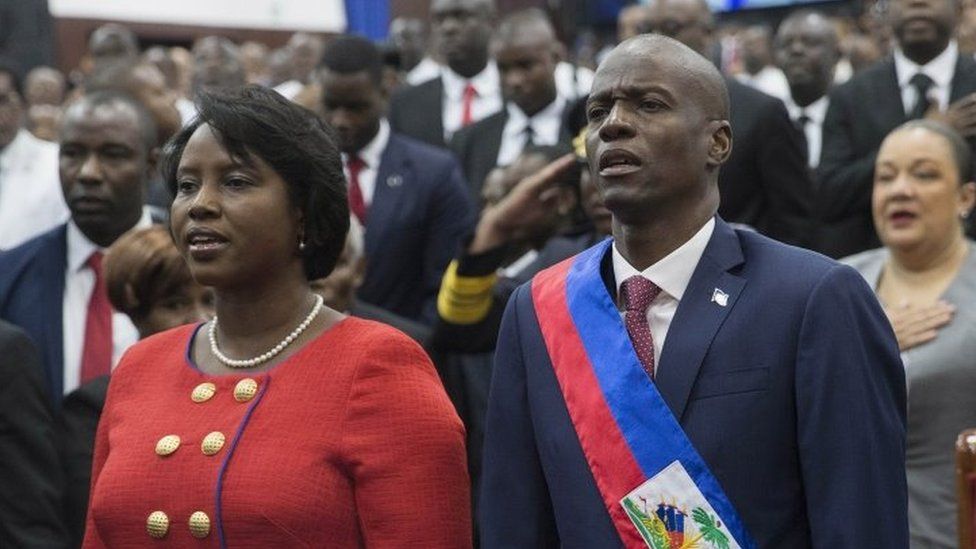 IMAGE COPYRIGHTEPA
IMAGE COPYRIGHTEPAThey say their priority now is to find the “mastermind” behind the assassination.
Acting Prime Minister Claude Joseph said President Moïse had opposed ”some oligarchs in the country, and we believe those things are not without consequences″. However he did not elaborate further on his suspicions.
There is no question that Mr Moïse, who was a banana exporter before running for office, made many enemies during his time as president.
His critics accused him of embezzlement and of using gangs to intimidate his opponents, charges which he rejected.
In 2018, there were widespread protests when he tried to raise fuel prices, and earlier this year a dispute over the length of his term saw powerful figures calling for him to step down.
The fact that he had ruled by decree for the past year-and-a-half after the country failed to hold parliamentary elections as planned in October 2019 triggered accusations that he was turning increasingly autocratic.
His plan to hold a constitutional referendum further incensed those who accused him of wanting to increase the power of the executive.
But when he said in February that an attempt to kill him and overthrow his government had been foiled, many dismissed it as a smoke-screen to divert attention away from the growing discontent in Haiti.
After all, despite all the political instability Haiti has lived through, the last time a Haitian president was assassinated while in office was in 1915, more than 100 years ago.
bbc.com

